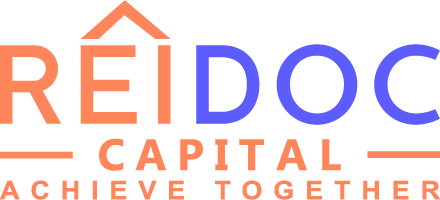There are TONS of ways in which to get started investing in real estate. Everything from crowdfunding sites to residential real estate fix and flips to commercial storage units and office buildings are at your fingertips if you know where to look.
This is also why, as a beginner in the whole wide world of real estate investing, you might feel overwhelmed. However, with a little guidance, you’ll be able to narrow down which types of investments suit your lifestyle, financial goals, and personality best.
Ultimately, it’s likely that, after slogging through those six soul-searching steps, you fall into one of these groups:
- The Lots of Money / Little Time / Hands-off Investor
- The Little Money / Little Time / Hands-off Investor
- The Little Money / Plenty of Time / Hands-on Investor
- The Lots of Money / Plenty of Time / Hands-on Investor
Ready to learn which investments fit each type of investor?
Let’s go!
The Lots of Money / Little Time / Hands-off Investor
If you’re someone who fits nicely into this category, it’s likely you’ve been saving a while or investing in the stock market since the day you received your first paycheck. It’s also possible that the tax breaks, passive income, and potential positive impact your real estate investments can make on a community are attracting your attention.
However, you’re a very busy individual – maybe with a family or in the prime of your career or both! You haven’t the time to research neighborhoods and markets or tour properties, much less to actively renovate or manage a property.
Recommendation: Become a Passive Investor
For investors with cash but no time on their hands, passive real estate investments are the ticket. You can invest passively through turnkey rental properties or commercial real estate syndications.
Turnkey Rental Properties
Turnkey rental properties are smaller scale and as simple as they sound. You purchase a to-be rental property, ready to go, with minimal involvement or work needed.
Commercial Real Estate Syndications
Another opportunity lies in group investments where money is pooled together to buy a large piece of commercial real estate property – a syndication.
Syndicators do all the research for you, from analyzing markets to meeting brokers, hiring contractors, and much more. They find commercial real estate they think would be a home run investment and then orchestrate the deal, the renovations, operations of the property, and a few years down the road, the sale.
This is where investors like you come in. You rely on the syndicators’ time, expertise, and team. Meanwhile, your money is invested, and every quarter you receive a distribution check, your portion of the returns earned on the asset. Plus, when the property sells after the hold period, you receive a part of the sale’s profits.
Overview of These Types of Real Estate Investments
What you put in
Your money
What you leverage
Other people’s time and expertise
What you get
Ongoing passive income, confidence knowing your money is being put to good use by an experienced team.
The Little Money / Little Time / Hands-off Investor
In contrast, if you don’t have much money or time to spend investing in real estate (yet!), but are attracted to real estate as a way to build such wealth, there are options for you too!
One of the best ways to get started investing in real estate with little capital is crowdfunding sites.
Recommendation: Invest through a real estate crowdfunding site
Just as Kickstarter funds new products, there are real estate crowdfunding sites where people can pitch in low amounts of capital toward commercial real estate projects. The difference? Crowdfunded commercial real estate pays cash dividends instead of t-shirts and sneak peeks of the product’s prototype.
Real estate crowdfunding sites are open to public use, typically have low initial investment requirements, and are available to both accredited and non-accredited investors.
Overview of These Types of Real Estate Investments
What you put in
Your money (in small amounts)
What you leverage
Crowdfunding platforms, experienced deal sponsors, strength in numbers (i.e., lots of people all putting in small amounts of money)
What you get
Tons of choices on crowdfunding platforms and real estate projects, ability to invest with very little capital, various project types and project lengths to suit your investment goals
The Little Money / Lots of Time / Hands-on Investor
So, you’re interested in real estate, but cash isn’t exactly “flowing” in your life right now. That’s okay, because if you’re willing to roll up your sleeves, there are still ways you can make your first investment in real estate.
You still have something of value to bring to the table, sweat equity. This means you’re willing to spend the time and effort to find properties, devour the paperwork, rehab the property (maybe personally), and make your passion for real estate become create cash.
Your Strengths, Interests, and Goals
If the above describes you, take a moment to identify your strengths and passions. Does the thrill of the hunt for deals interest you the most? Is the renovation planning and execution process exciting to you? Maybe you’re a numbers nerd and can’t wait to analyze the trends and markets of each neighborhood?
Additionally, what are you in it for? Long term equity or short-term capital?
Here are some of the most common ways you can invest in real estate with little money and lots of time.
Recommended Real Estate Investment Strategies
- Fix and Flips
This is where you buy a run-down piece of property, fix it up, and then sell it for a profit – just like it sounds! If you don’t have cash for a down payment, short-term private loans might be an option. You just need a few months to a year or complete the renovations. Then when the property sells, you pay off your loans and pocket the profits.
- The BRRRR Strategy
I hate to break it to you, but no, BRRRR doesn’t mean it’s cold in here. BRRRR stands for buy, renovate, rent, refinance, and repeat. It’s a lot like the fix and flip strategy except that you hold onto the asset long term.
If you took out a private loan to cover the down payment, you pay off that loan during the refinance step of the process. If done correctly, the value of the property after renovations/repairs will be significantly higher than the purchase price. This abrupt upward appreciation will allow you to do a cash-out refinance and pay off any loans you took to buy the property.
- Wholesaling
If you’re a good networker and happen to know of off-market deals, you may be able to get a property under contract at a low price. Then, while under contract and before the purchase is complete, you wholesale it to another buyer at a higher price. The difference between the two purchase prices goes in your pocket.
- House Hacking
Depending on your local market, you may be able to get your foot in the proverbial real estate door via house hacking. This is where you buy a property with 2-4 units, you live in one of them, and you rent out the other units. The rental income received from other tenants pays your mortgage. Sweet!
- Real Estate Crowdfunding Sites
Crowdfunding sites are a great place to start learning about real estate syndications without the pressure of running one (yet!). You can learn to find and compare deals, research sponsor teams’ track records, and learn what to expect in a syndication deal as far as communication and returns for investors.
Overview of These Types of Real Estate Investments
What you put in
Your time
What you leverage
Other people’s money
What you get
Firsthand experience, potential for high returns on very little cash investment
The Lots of Money / Lots of Time / Hands-on Investor
Um, can we be best friends?
You’re in a fantastic position to make your money grow exponentially.
Recommendation: Lead commercial real estate syndications
If you’d like to be an active investor, leading your own syndications puts you in the driver’s seat. You get to find the deals, assemble the team, raise the capital, and have a say in the day-to-day operations. The choice is yours to go it alone as the syndication lead or to partner with others and create a syndication business.
Recommendation: Become a passive investor in commercial real estate syndications
You also have the option to be a passive investor who’s extremely active in finding and vetting deals for real estate syndicators or private equity firms.
Savvy passive investors know the lingo and have some basics down about deal structures and underwriting. Any investment can look great in a fancy marketing packet, but only savvy investors will know the right questions to ask and be able to reveal details about the deal and the team.
Overview of These Types of Real Estate Investments
What you put in
Your money and your time
What you leverage
The power of others’ expertise, time, and money to help you go bigger, faster
What you get
The freedom to carve your own path and maximize how hard your money is working for you
Summary
This article just threw a ton of information at you, and even though it was separated into categories, an overview might do you some good.
From there, it’s likely you fell into one of four categories. Within each group, beginner investors have multiple opportunities to get started on their real estate investment journey. Our suggestions for real estate investment opportunities per investor-type are as follows:
The Lots of Money / Little Time / Hands-off Investor
Consider investing passively in commercial real estate syndications
The Little Money / Little Time / Hands-off Investor
Consider investing small amounts through real estate crowdfunding sites
The Little Money / Lots of Time / Hands-on Investor
Lots of options: Fix and flip, BRRRR method, wholesaling, house hacking, crowdfunding, and more
The Lots of money / Lots of time / Hands-on Investor
Active: Consider leading your own commercial real estate syndication
Passive: Invest through real estate crowdfunding sites or directly through syndicators and private equity firms
Conclusion
All in all, there are real estate investment opportunities for every type of investor, at every stage of life, with any range of available capital and time freedom. Once you’re able to identify which investor type you are at this time in your life, you can see the opportunities within that category and how they make sense for you.
One common misconception is that you need a decent amount of capital saved up in order to get started investing in real estate. The options presented above, coupled with The Little Money investor type, debunked that myth!
Now, I encourage you, don’t wait a minute longer. Get started toward becoming a real estate investor by taking action on one of the passive or active investment opportunities described above, according to the category in which you best fit.
We look forward to chatting with you in the near future about our syndication opportunities.





